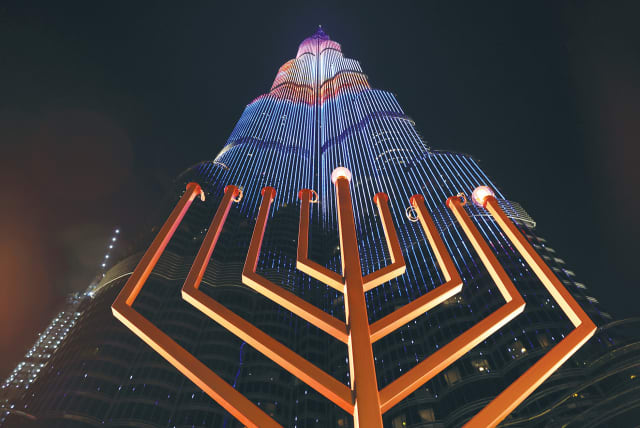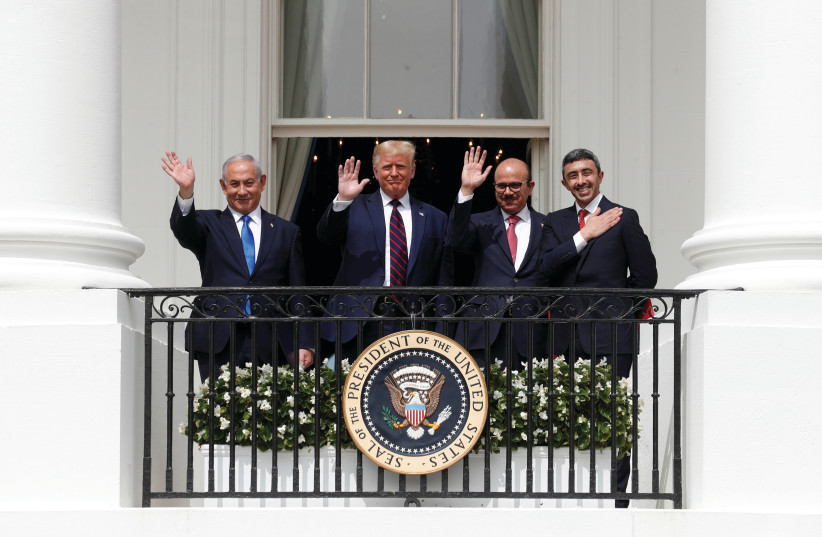Israel needs to anchor the Abraham Accords - opinion

The government must appoint a senior official or even set up a division or agency, whose role would be to nurture and maintain the Abraham Accords.
The mere phrase “Abraham Accords” embodies endless magic and promise for the majority of those living in Israel. This once-forbidden treasure, which had been opened approximately two years ago and which had allowed Israelis to re-taste the flavor of the Moroccan street and discover the wonders of the Gulf, comprises within it both a fairytale experience, as well as a gateway to the many markets of the Arab and Muslim world, which the ways to them have thus far been blocked.
The magic is also embodied in that it is not only a gateway to Gulf States that had signed the Abraham Accords themselves, but through them to many others with which Israel does not yet have any diplomatic relations or with which it has meager or clandestine ones.
While the Israeli embassy in Abu Dhabi organized a candle-lighting ceremony for the Jewish Festival of Hanukkah, with hundreds of people proudly singing songs depicting the Jews’ victory over those who had historically tried to destroy our people, Israeli businessmen and women can proudly and unapologetically announce their Judaism without fear in the streets of Bahrain, the UAE and Morocco.
Thus, in a manner of speaking, Israel had been promoted from the status of a secret lover to that of an official wife. Yet the official wife who serves as the pillar of the home also needs nurturing and must not be taken for granted.
The halls of the Tel Aviv Hilton Hotel were recently overflowing with many high-ranking Israelis during the celebrations of the National Days of Bahrain and the UAE. However, that may not suffice to make the Bahraini or the Emirati “street” more amenable to normalization between our two people.
The courage and pioneering of the UAE and Bahraini leadership in signing the Abraham Accords are indeed outstanding and should be commended. Yet, if the members of the Abraham Accords will not work systematically and strategically toward creating new and creative venues for cooperation between the actual people of the member states, this peace may be short-lived and the vast potential power of this newly-found friendship may remain unattainable.
A wonderful example of this may be the very recent performance of the Israeli Philharmonic in Abu Dhabi, which touched the hearts and minds of many in the UAE. This endeavor demonstrated, once more, how important it is to create an emotional and cultural tie between people.
I am far less concerned about the potential cooling of the relations, on the political and security level as a result of the formation of the newly-elected government in Israel. One should recall that the Abraham Accords were originally forged while the Israeli government was a right-wing-led administration, perhaps not as strongly right-wing as the current incoming one, yet right-wing all the same.
Furthermore, the leaderships of the Gulf States and Morocco, autocratic in their nature, refrain from criticizing others for the infringement of human rights or the lack of a liberal policy, even if it pertains to Israel. The complexity and concern lie with having the agreement seep down to the people, or more precisely, to the hearts and minds of the people. Emotion is, indeed, the characteristic that will determine whether we shall succeed in anchoring these game-changing Abraham Accords, despite the potential instability that often characterizes our region.
The suspicion of the Gulf States towards the current and previous American administrations stands out, owing to what they perceive as the complete lack of loyalty displayed by the Americans toward the Kurds in Syria, left to their destiny amidst their enemies; the quick withdrawal from Afghanistan and the complete lack of a physical military response despite the Syrian leadership’s use of chemical weapons against its own people, despite the American declarations that this will be viewed as a red line. That is, while at the same time, the American administration was seen to be courting the Iranian regime vis-a-vis its wish to renew the nuclear deal that had previously been annulled.
THESE CIRCUMSTANCES created a clear platform upon which the Gulf States sought strong regional partners who would, if needed, stand beside them against Iran. These regional circumstances remain relevant today, too, two years following the signing of the accords, thus dimming the possibility of the respective governments contributing to their demise on the government-to-government and strategic level.
Yet what shall occur if the partners’ common threat was to disappear?
Will the newly-found marriage be torn apart owing to the lack of an emotional, cultural glue amidst the nations? Will the economic and business cooperation suffice or must we create other, more emotional anchors that will maintain the glue? We should not forget that economic and business cooperation, albeit clandestine, was also in place prior to the signing of the accords.
Israel does not unfortunately excel in strategic planning yet the issue at hand is key. The government must appoint a senior official or even set up a division or agency, whose role would be to nurture and maintain the Abraham Accords. For that purpose, Israel must also recruit the hesitant and reluctant Europeans, who had thus far kept themselves rather aloof from the regional marvel, owing to the fact that they saw it as a move that intended to dismiss and sideline the Israeli-Palestinian conflict resolution.
Israel must make clear that an unstable region undoubtedly means more illegal immigrants to the shores of Europe and thus such accords must be maintained and encouraged. Israel must also clarify that widening the accords towards central Asian countries and to the southern states of Europe necessarily means creating alternative corridors of energy, particularly during a time when energy sources are becoming a problem, given the Russian-Ukrainian war. It should furthermore be made unequivocal that dealing and negotiating with Iran, will recklessly strengthen destabilizing extreme factors which are at the helm there. This will – in turn – destabilize and weaken Europe.
Finally and not less important, particularly in this post-World Cup period, it is pertinent to impress first upon ourselves and also upon the international arena, that Qatar is not a friendly partner to positive regional developments, but to the contrary – it is a destabilizing and negative force and thus much energy should be invested in strengthening the Abraham Accords which may keep such an actor in the tail.
Israel cannot allow itself to leave all of the above to chance. It must take an active role in maintaining, strengthening and widening the Abraham Accords. This is nothing less than a strategic endeavor. Particularly in lieu of movement on the Israeli-Palestinian front, in the foreseeable future, new and creative ways must be adopted in order to also create emotional and cultural bridges between the nations of the respective countries, in order to solidify and anchor the union.
The writer, a former MK, was the founder and co-chair of the first Abraham Accords Caucus in the Knesset.
Jerusalem Post Store
`; document.getElementById("linkPremium").innerHTML = cont; var divWithLink = document.getElementById("premium-link"); if (divWithLink !== null && divWithLink !== 'undefined') { divWithLink.style.border = "solid 1px #cb0f3e"; divWithLink.style.textAlign = "center"; divWithLink.style.marginBottom = "15px"; divWithLink.style.marginTop = "15px"; divWithLink.style.width = "100%"; divWithLink.style.backgroundColor = "#122952"; divWithLink.style.color = "#ffffff"; divWithLink.style.lineHeight = "1.5"; } } (function (v, i) { });

